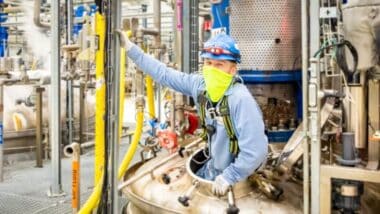Novonesis Lets Nature Guide Sustainability Plans

When it comes to good environmental stewardship, Novonesis takes its cue from the natural world itself.
“We are inherently sustainable because we draw from nature,” said Novonesis Senior Vice President of Planetary Health Biosolutions Rene Garza. “As biology matures, we find that nature has evolved to be an efficient utilizer of every single resource out there.”
Back to basics: It’s the perfect model for the newly formed Lyngby, Denmark–headquartered biosolutions firm, the product of a January merger between two Danish legacy companies: enzyme and microbial technology firm Novozymes and bioscience supplier Chr. Hansen.
- The portfolio of Novonesis—which is a combination of the Greek words for “new” and “beginning”—includes enzymes, microbes, novel vitamins and other naturally derived offerings.
- The business has customers across more than 30 industries: food and beverages, animal health and nutrition, energy, fine chemicals, dietary supplements, household care, plastics, plant health and more.
An early adopter: Legacy firm Novozymes set its sights on sustainable business practices more than two decades ago. In 2002, it became the first company in the world to publish a triple bottom-line integrated report.
- “We recognized early on that resources are finite, and the need to do more with less is part of ensuring a better quality of life,” Garza said of the company’s decision to undertake the annual report, a method of stocktaking on sustainability activities using three “bottom lines”: profit, people and planet. “We realized we’re not just here to generate money, but also to create an impact on society and our environment.”
Big goals: That’s why Novonesis has set lofty aims for itself (and is meeting them).
- Firmwide targets include carbon net neutrality by 2050, as well as a 75% reduction in emissions from its own operations and a 35% reduction in emissions from its supply chain by 2030.
- How is it doing all this? Innovation and persistence, according to Garza. “We want to improve our efficiency by as much as we can, and we do this by making improvement to our hardware—pump replacements, reengineering [of] our microorganisms. We also source renewable energy.”
- In fact, Novonesis is on track to source 100% of its energy from renewables by next year. Between 2018 and 2022, it reduced absolute emissions by 63% while increasing revenue.
Water, too: Novonesis knows how important water use is in the overall sustainability picture.
- The company is piloting a reverse-osmosis filtration system at its North America headquarters in Franklinton, North Carolina, that lets it recycle and reuse water. The program, scheduled for full operationality by next year, is going so well there are plans to replicate it at other Novonesis facilities worldwide.
- And at the company headquarters in Denmark, “we have been able to recycle 58 million liters [of water]—the equivalent of 23 Olympic-size swimming pools,” Garza reported.
What government can do: Novonesis and other manufacturers are making great strides in sustainability, but having the right policies in place at the federal level would make it easier for them to do more with less, Garza continued.
- “We need regulatory reform,” he told the NAM. “Federal regulations, if done well, really can drive innovation, particularly in biotechnology. … The government should [also] invest in pilot and demo scale fermentation capacity to allow startups to scale up.”
- The U.S. has the largest concentration of startup companies in the world, he went on, but there is now a “valley of death” between discovery and commercialization of innovations in biology, which federal funding could help remove.
- Finally, manufacturing in the U.S. needs the reinstatement of pro-growth policies from the 2017 Tax Cuts and Jobs Act, including 100% expensing for research and development costs and accelerated depreciation for capital investments.
Stakeholder education: Getting more people aboard the sustainability train is doable—but it will require continued education campaigns.
- “We need long-term thinking [and] to encourage stakeholders to prioritize the long-term over short-term gains,” Garza said. “Sustainability is about balancing immediate and future needs.”
